英语动词的语气
动词的语气、虚拟语气
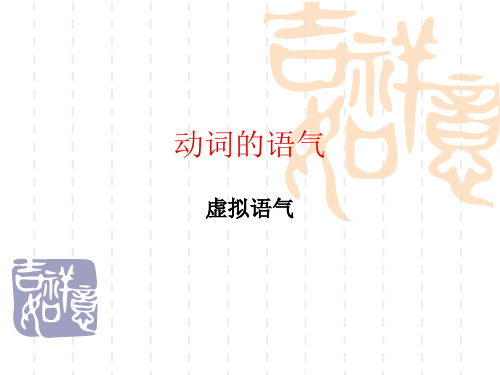
▪ If they didn’t take physical exercises every day, they wouldn’t be so healthy.
▪ (fact: They take physical exercises every day, so they are very healthy.)
▪ 要是有人警告过他,他就不会吃那个食物 了。
▪ If he had been warned, he would not have taken that food.
▪ 如果你服从命令的话,灾难就不会发生了。 ▪ If you had obeyed the order, the
disaster could not have happened.
▪ 虚拟语气是一种特殊的动词形式,用来表 示说话人所说的话不是一个事实,而只是 一种愿望、假设、怀疑、建议、猜测、可 能或纯粹的空想等。
▪ 在英语中,虚拟语气是通过句子中谓语动词的特 殊形式来表示的。这又一次证明动词在英语中的 核心地位,又一次证明要学好英语语法,就要学 好英语动词。由于虚拟语气是通过句子中谓语动 词的特殊形式来表示的,因此,掌握虚拟语气中 所使用的各种谓语动词形式变化是掌握虚拟语气 的关键,这也是虚拟语气的难点。虚拟语气本身 也是英语语法的一个难点。学习虚拟语气的方法 是分别弄通虚拟语气的各种句型和结构,各个击 破。下面对虚拟语气在各种句式中的用法分别介 绍。
▪ 现将虚拟语气在条件句中的各种具体形式 和用法分述如下:
▪ 1. 对现在的虚拟,表示与现在事实相反的 假设时,条件状语从句的谓语动词用过去 式(be的过去式用were),而主句中的谓语 动词用would (should, could, might) + 动词 原形。见下表:
grammar(虚拟语气)
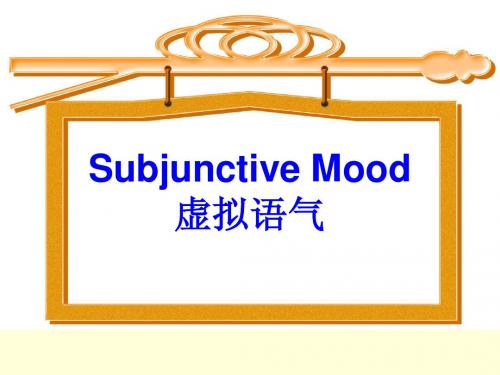
8. It’s necessary/strange/natural/ important/pity/no wonder/impossible + that---Clause 从句中的动词要用虚拟, 即 (should)+动词原形 It is important that we ( should ) master a foreign language. It is strange that she refuse to come to the party. It’s necessary that we should study hard.
将来:
Would\could\sho uld\might+v
He behaves as if he owned the house.
(But he doesn’t own it or probably doesn’t own it or we don’t know whether he owns it or not.)
一. 虚拟语气在条件状语从句中的用法。
条件 If 从句的谓语形 从句 式 主句的谓语形式 would/could/should/ might +V (原) would/could/should/ might+have+p.p.
现在
过去
V. + ed (were) had done
1.V.+ ed. would/could/should 未来 2. should+ V.(原) /might +V. (原) 3. were to do
与将来事实相反
If 从句:1.V.+ ed. 2. should+ V.(原) 3. were to do 主句:would/could/should/might +V. (原)
英语口语中的常见语气表达

英语口语中的常见语气表达语气表达在英语口语中起到非常重要的作用,它可以用来表达说话者的情感、态度以及对事物的看法。
以下是英语口语中常见的语气表达方式及其用法。
1. 祈使语气 (Imperative Mood)祈使语气用于表示请求、命令、建议或劝告等,常见的形式包括动词原形和"Let's + 动词原形"。
例句:- Please close the door.(请关门。
)- Let's go to the park.(我们去公园吧。
)2. 祝愿语气 (Wish Mood)祝愿语气用于表达对将来情况的期望和祝愿,常见的形式包括"I wish (that) + 句子"和"May + 主语 + 动词原形"。
例句:- I wish you good luck in your new job.(祝你在新工作中好运。
)- May you have a wonderful journey.(祝你旅途愉快。
)3. 假设语气 (Conditional Mood)假设语气用于表示虚拟、假设或条件意义,常见的形式包括"if + 主语 + 动词过去式"和"should + 动词原形"。
例句:- If I had more money, I would travel around the world.(如果我有更多的钱,我会环游世界。
)- Should you need any assistance, feel free to ask.(如果你需要任何帮助,随时问我。
)4. 告诫语气 (Admonitory Mood)告诫语气用于表示警告、劝阻或责备的意思,常见的形式包括"Be careful + 现在分词/形容词"和"Don't + 动词原形"。
例句:- Be careful when crossing the road.(过马路时要小心。
英语句子中谓语动词的语气有三种

英语句子中谓语动词的语气有三种:1. 直陈语气(The Indicative Mood)直陈语气用于直截了当地陈述事实、描述状态:He has published quite a number of essays this year .他今年已发表了好几篇论文。
2. 祈使语气(The Imperative Mood)祈使语气用于提出请求、命令、建议或是劝告等:Wait outside until you are asked . 请在外面等候,请你进再进去。
Let's just take a break, shall we ? 我们休息一会儿,好吗?3. 虚拟语气(The Subjunctive Mood)虚拟语气用于表示主观愿望和假设的虚拟情况。
虚拟语气不太顾及事实的存在,它表现出说话人的主观因素比较多。
所以说话人所讲的内容往往是与事实相反的;或是其实现的可能性微乎其微,甚至于没有实现的可能性。
当然,有时为了使说话的语气客气、缓和、委婉,也使用虚拟语气。
例如:I wish you were more careful .但愿你更细心一些。
If I had more money, I would buy a bigger apartment.我要是有再多一点钱,我就买一套更大一些房子。
Would you mind shutting the door ? 劳驾您把门关上。
一、虚拟语气在条件状语从句中的构成和用法1. 表示一种与过去事实相反的假设情况,条件从句中的谓语动词要用“had+过去分词”,主句中的谓语动词要用“would / should / could / might+have+过去分词”。
如:If you had come here yesterday, you would have seen him. 如果你昨天来到这里,你就会看见他了。
2. 表示一种与目前事实相反的假设情况,条件状语从句中的谓语动词要用一般过去式(be动词常用were),而主句中的谓语动词则要用“would / should / could / might+动词原形”。
虚拟语气
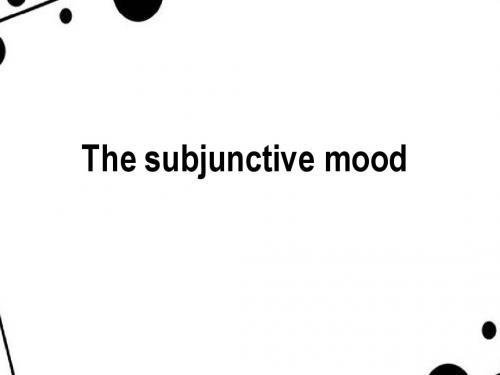
1.If I had enough money, I would buy a new car.
(have, buy)
2.We would have won if Jack had scored that goal. ( win, score) 3.If I were you , I would go to bed early tonight. 4.If it were to rain tomorrow, they would not go out . (be , go) (rain, go out).
C had it not been for the sun . D if it shouldn't be for the sun. 3. ______. Everything would have been all right. A had he been here . B here he had been .
C been here he had . D had he been here . 4.___fired, your health care and other benefits will not be immediately cut off . A would you be . C could you be . B should you be . D might you be .
B 1._____it rain tomorrow, we would have to ___the picnic. A would , put forward. C were, put off . B should , call off . D should call off.
D 2.Without electricity today , human life ____ quite different . A is . B would have been . C will be . D would be . B 3.What would you do if the war ______? A would break out . B were to break out . C will break out . D is broken out . B 4. ____he come , the problem be settled. A would , B should . C shall . D if .
英语语气的用法大全

英语语气的用法大全语气及其种类1)语气(mood)语气是一种动词形式,表示讲话人对某一行为或事情的看法和态度。
2)语气的种类语气可分为下列三种:a)直陈语气(indicative mood)表示讲话人认为他所说的话是一个事实。
如:There are two sides to every question.每个问题都有两个方面。
Jinzhou is famous for its apples.锦州以产苹果闻名。
Comrade Zhang Side had a deep love for the Party.张思德同志对党怀有深厚的爱。
b)祈使语气(imperative mood)表示讲话人对对方的请求或命令。
如:Bring along your exercise books tomorrow.明天把练习本带来。
Make yourself at home.请随便,不要客气。
Don't move! 不许动!Don't be late.不要迟到。
Be quiet! 请安静!c) 虚拟语气 (subjunctive mood)。
虚拟语气 A虚拟语气虚拟语气是一种特殊的动词形式,用来表示说话人所说的话不是一个事实,而只是一种愿望、假设、怀疑、建议、猜测、可能或纯粹的空想等。
如:If I were not so busy,I would go with you.假如我不太忙,我会和你一起去。
(表示假设)I wish Lao Li were here.H6 would know how to fix the machine.老李在这儿就好了,他会知道怎样把机器修好的。
(表示愿望)He suggests that we should all go to see the film.他建议我们都去看电影。
(表示建议)虚拟语气的动词形式比较特殊,共有下列七种:1)动词原形(用于一切人称和数)2)动词的过去式(用于一切人称和数,be的过去式用were)3) had + 过去分词(用于一切人称和数)4) should + 动词原形(用于一切人称和数)5) should have + 过去分词(用于一切人称和数)6) should (第一人称),Would(第二、三人称) + 动词原形7) should(第一人称),Would(第二、三人称) + have + 过去分词[注]上述某些动词形式和直陈语气的某些动词形式相同,但它们的用法及其所表示的时间概念则完全两样,二者切不可混淆。
动词的语气

动词的语气——虚拟语气(The Subjunctive Mood)一、语气的定义和种类l、语气:语气是动词的一种形式,它表示说话人对某一行为或事情的看法和态度。
2、语气的种类:(1)陈述语气: 表示动作或状态是现实的、确定的或符合事实的,用于陈述句、疑问句和某些感叹句。
如:We are not ready. 我们没准备好。
What a fine day it is!多好的天气啊!(2)祈使语气: 表示说话人的建议、请求、邀请、命令等。
如: Open the door, please。
请打开门。
(3)虚拟语气: 表示动作或状态不是客观存在的事实,而是说话人的主观愿望、假设或推测等。
如: If I were you, I should study English. 如果我是你,我就学英语了。
May you succeed! 祝您成功!二、虚拟语气在条件从句中的用法条件句有两类,一类是真实条件句,一类是虚拟条件句。
如果假设的情况是有可能发生的,就是真实条件句。
在这种真实条件句中的谓语用陈述语气。
如: If it doesn’t rain tomorrow, we will go to the park. 如果明天不下雨,我们就去公园。
如果假设的情况是过去或现在都不存在的,或将来不大可能发生的,则是虚拟条件句。
如: If he had seen you yesterday, he would have asked you about it. 如果他昨天见到你,他会问你这件事的。
(事实上他昨天没见到你,因此也未能问你这件事。
)在含有虚拟条件句的复合句中,主句和从句的谓语都要用虚拟语气。
现将虚拟条件从句和主句的动词形式列表如下:与现在事实相反: 从句: 动词的过去式(be的过去式一般用were)主句:would/ should/ could/ might + 动词原形与过去事实相反: 从句:had + 过去分词主句:would/ should/ could/ might + have + 过去分词与将来事实相反: 从句:动词过去式,should + 动词原形,主句:were to + 动词原形would/ should/ could/ might + 动词原形注: 主句中的should只用于I、we,但在美国英语中,should常被would代替;从句中的should可用于各种人称。
高中英语语法 动词的语气——虚拟语气讲解
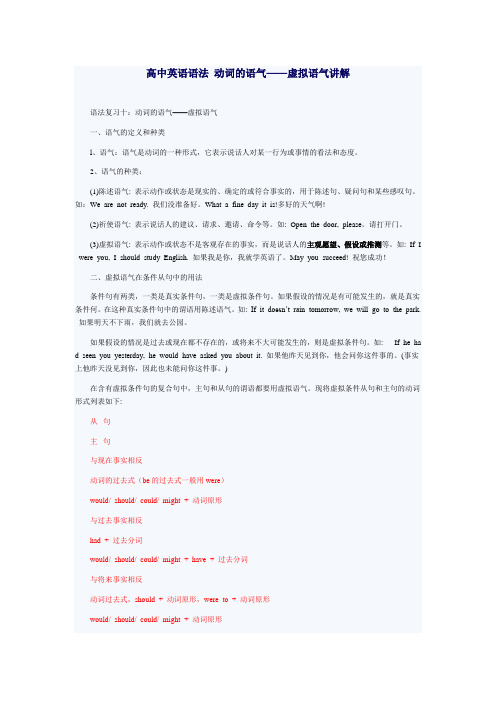
高中英语语法动词的语气——虚拟语气讲解语法复习十:动词的语气——虚拟语气一、语气的定义和种类l、语气:语气是动词的一种形式,它表示说话人对某一行为或事情的看法和态度。
2、语气的种类:(1)陈述语气: 表示动作或状态是现实的、确定的或符合事实的,用于陈述句、疑问句和某些感叹句。
如:We are not ready. 我们没准备好。
What a fine day it is!多好的天气啊!(2)祈使语气: 表示说话人的建议、请求、邀请、命令等。
如: Open the door, please。
请打开门。
(3)虚拟语气: 表示动作或状态不是客观存在的事实,而是说话人的主观愿望、假设或推测等。
如: If I were you, I should study English. 如果我是你,我就学英语了。
May you succeed! 祝您成功!二、虚拟语气在条件从句中的用法条件句有两类,一类是真实条件句,一类是虚拟条件句。
如果假设的情况是有可能发生的,就是真实条件何。
在这种真实条件句中的谓语用陈述语气。
如: If it doesn’t rain tomorr ow, we will go to the park.如果明天不下雨,我们就去公园。
如果假设的情况是过去或现在都不存在的,或将来不大可能发生的,则是虚拟条件句。
如: If he ha d seen you yesterday, he would have asked you about it. 如果他昨天见到你,他会问你这件事的。
(事实上他昨天没见到你,因此也未能问你这件事。
)在含有虚拟条件句的复合句中,主句和从句的谓语都要用虚拟语气。
现将虚拟条件从句和主句的动词形式列表如下:从句主句与现在事实相反动词的过去式(be的过去式一般用were)would/ should/ could/ might + 动词原形与过去事实相反had + 过去分词would/ should/ could/ might + have + 过去分词与将来事实相反动词过去式,should + 动词原形,were to + 动词原形would/ should/ could/ might + 动词原形注: 主句中的should只用于I、we,但在美国英语中,should常被would代替;从句中的should 可用于各种人称。
英语中动词的三种语气
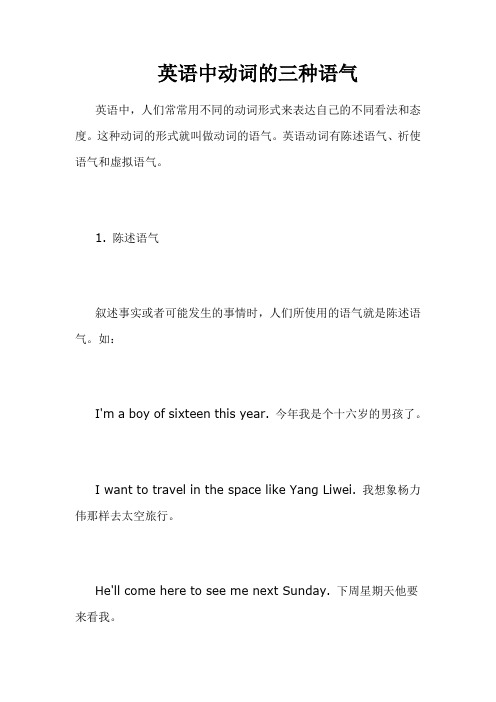
英语中动词的三种语气
英语中,人们常常用不同的动词形式来表达自己的不同看法和态度。
这种动词的形式就叫做动词的语气。
英语动词有陈述语气、祈使语气和虚拟语气。
1. 陈述语气
叙述事实或者可能发生的事情时,人们所使用的语气就是陈述语气。
如:
I'm a boy of sixteen this year. 今年我是个十六岁的男孩了。
I want to travel in the space like Yang Liwei. 我想象杨力伟那样去太空旅行。
He'll come here to see me next Sunday. 下周星期天他要来看我。
2. 祈使语气
人们用来表示命令、要求、请求、邀请、劝告或建议时所使用的语气就是祈使语气。
如:
Hurry up. 快点。
Don't go there. 不要去那儿。
Open your books at P. 126. 翻开书126页。
3. 虚拟语气
表示所说的话不是事实,而只是一种愿望、猜测、假设、建议,并且这种愿望、建议等实现的可能性很少或根本不能实现时,所使用的语气就是虚拟语气。
如:
If I were a bird, I could fly in the sky freely. 要是我是一只鸟,我就能自由自在地在天空飞翔。
I wish you a happy new year. 祝你新年愉快。
I'd rather you came this afternoon. 我倒想要你今下午来。
1.英语动词有三种语气,陈述语气,祈使语气和虚拟语气。

3. If I had taken your advice, I wouldn’t have made a mistake. 4. If you had come earlier, you might have caught
1.英语动词有三种语气, 陈述语 气,祈使语气和虚拟语气。
2. 定义:用来表示说的话不是事 实,或者是不可能发生的情况, 而是一种愿望,建议,假设的 语气叫虚拟语气。
一:虚拟语气在条件状语 从句 中的用法。把这个表格记下来。
现在 过去
将来
If 从句的谓语形式 主句的谓语形式
一般过去时
would/could/should /might +V.(原)
3. the
The guard rules.
of
the
meeting
insisted
that
everybody_B____
A. obeys B. obey C. will obey D. would obey
4. see
“Jack’s been a doctor.”
ill
for
some
weeks.”
Without your help, I would have failed.
But for water, it would be impossible to live in the desert.
二:虚拟语气特殊句型:
过去虚拟: 1. wish
过去完成时
宾语从句 现在虚拟:
过去时(were)
将来虚拟:
“I
know.
英语动词有 语气
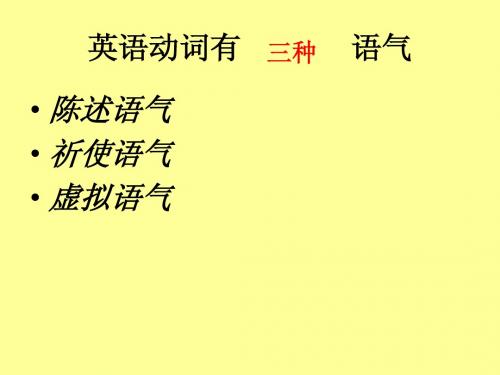
9.I B _____ you some money, but I hadn’t any on me then. A. would lend B. would have lent C. could lend D. may have lent C 10. A few minutes earlier and we _____ the rain. A. have caught B. had caught C. could have caught D. were to catch 11.--- “Have you ever been to Beijing?” --- “No, but I wish I _____” D A.have B. will C. do D. had C 12.We _____ the work on time without your help. A. hadn’t had finished B. didn’t have finished C. couldn’t have finished D. can’t have finished
• 3. If he _________ me tomorrow, I would let him know. • A. should call B. should not have been able • C. were not able to call D. are not able to call • 4. If you asked your father, you ______________ permission. • A. may get B. might get • C. should have called D. maybe get • 5. ______ today, he would get there by Friday. • A. Would he leave B. Was he leaving • C. Were he to leave D. If he leaves • 6. ______I you, I would go with him to the party. • A. Was B. Had been C. Will be D. Were
动词的语气(陈述语气与虚拟语气、祈使语气)

动词的语气-------陈述语气、祈使语气与虚拟语气语气是动词的一种形式,表示说话人对说话内容的看法和态度。
一、语气的种类1、陈述语气:表示说话人认为他说的话是事实They went to visit the Great Wall Y esterday.He likes chemistry.What a clever boy he is!2、祈使语气:表示说话人提出请求、命令、劝告、警告、号召等Don’t leave today’s work for tomorrow.Be more careful next time.Work hard and you will succeed.Be quick or you’ll be late.3、虚拟语气:表示说话人认为他所说的话是和事实相反的主观设想或主观愿望。
If I were you, I would study hard.I wish she had taken my advice.试比较:(陈述语气)我希望他能来北京。
(很可能来)I wish he came to Beijing. (虚拟语气)我真希望他能来北京。
(不可能来,只是表示愿望)I suggest he come to Beijing. (虚拟语气)我建议他来北京。
(可能来也可能不来,只表示建议)(陈述语气,可能是候选人说)(虚拟语气,可能是小学生说)(陈述语气,得过第一名的人说)If I won the race, I would buy a car. (虚拟语气,最后一名说)在陈述语气中,主、从句时间一般要取得一致;而在虚拟语气中,主、从句时间经常不一致,不互相制约,因为表示愿望、假设等。
如:(时间一致,都表示将来)如果明天下雨,我就不出门了。
(时间不一致,主句表示现在,从句表示过去)如果昨晚下雨的话,现在地上就会是湿的。
二、虚拟语气在条件句中的用法1、虚拟语气在if条件句中的使用。
英语动词的语气及练习

英语动词的语气及练习一、概述语气是一种动词形式,是讲话人对说话内容的看法的语法范畴,英语中有三种语气,即陈述语气、祈使语气和虚拟语气。
二、语气的种类1、陈述语气(indicative mood)表示谓语动词所表达的动作或状态是符合客观事实的,也就是说把动作或状态当作事实表达出来。
There are two sides to every question. 每个问题都有两个方面。
She is a very good student. 她是一个很好的学生。
2、祈使语气(imperative mood)表示讲话人对对方的请求、命令号召、劝告、警告、禁止。
Don’t be late for class. 上课不要迟到。
Take a seat, please.请坐。
3、虚拟语气(subjunctive mood)是一种特殊的谓语动词形式,用来表示一种假设、愿望、建议、请求、命令、猜测、可能、空想等非真实情况。
How I wish I were a bird!我多么希望我是一只小鸟!I suggest you should go to have a walk.我建议你去散步。
三、虚拟语气在非真实条件从句中的用法非真实条件句所假设的是不可能有的条件,或者是与事实相反的条件,这又可以分为三种情况。
1、表示与现在事实相反谓语动词的形式如下:If there were no subjunctive mood, English would be easier.I'd come too if I had time to spare.我如果抽得出时间的话,我也愿意来。
(与现在事实相反)If everyone in the country knew first aid,many lives would be saved.如果每个国民都懂得怎样急救,那么就可以挽救许多人的生命了。
(与现在事实相反)If I were you, I should do it.如果我是你的话,我就要做这件事。
【高中英语】高中英语语法:动词的语气
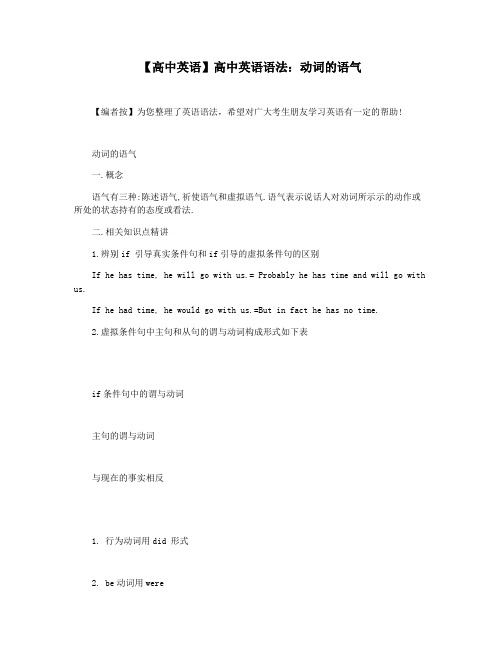
【高中英语】高中英语语法:动词的语气【编者按】为您整理了英语语法,希望对广大考生朋友学习英语有一定的帮助!动词的语气一.概念语气有三种:陈述语气,祈使语气和虚拟语气.语气表示说话人对劝词所示示的动作或所处的状态持有的态度或看法.二.相关知识点精讲1.辨别if 引导真实条件句和if引导的虚拟条件句的区别If he has time, he will go with us.= Probably he has time and will go with us.If he had time, he would go with us.=But in fact he has no time.2.虚拟条件句中主句和从句的谓与动词构成形式如下表if条件句中的谓与动词主句的谓与动词与现在的事实相反1. 行为动词用did 形式2. be动词用wereshouldwouldcould + 动词原形might与过去的事实相反had + doneshouldwouldcould + have + done might与将来的事实相反1. 行为动词用did2. should + 动词原形3. were to + 动词原形shouldwouldcould + 动词原形might3.混合时间的虚拟语气如果条件句中的动作和主句的动作不是同时发生,主句和从句的谓语动词的形式应分别根据各自所表示的时间加以调整。
1)0If I had received the passport yesterday, I would start today.2)If he had telephoned me last night, I would see him now.3)If he had followed the doctor’s advice, he would be all right now.4)If China had not been liberated, the working people would still be leading a miserable life.4.should/ could / might/ ought to + have done 表示“过去本应该/可以做而实际上却没做”needn’t have done 表示“过去没必要作而实际上做了”5.虚拟语气中的倒装句如果虚拟语气的条件从句谓语动词中含有were, had, could, should,有时可将if 省去,而将条件从句的主语置于were, had, should, could 之后。
语气(mood)是一种动词形式虚拟语气Ⅰ

虚拟语气语气(mood)是一种动词形式,用以表示说话者的意图或态度。
英语中的语气有三种:陈述语气、祈使语气和虚拟语气。
直陈语气(indicative mood),表示所说的话是事实。
祈使语气(imperative mood),表示所说的话是请求或命令。
虚拟语气(subjunctive mood),表示说的话不是事实,或者是不可能发生的情况,而是一种愿望、建议或与事实相反的假设等。
一. 虚拟语气在条件句中的应用学习虚拟语气在条件句中的用法之前我们必须清楚条件句的种类:条件句有真实条件句与非真实条件句(或称虚拟条件句)两种。
真实条件句所表的假设是可能发生或实现的,句中的条件从句与结果主句都用陈述语气。
如:If it doesn’t rain tomorrow, I will go for a picnic. 假若明天不下雨,我就去野餐。
Oil floats if you pour it on water. 你如把油倒在水里,油就浮起来。
虚拟条件句所表的假设则是不可能或不大可能发生或实现的,句中的条件从句与结果主句皆须用虚拟语气。
1. 与现在事实相反的虚拟条件句,条件从句的谓语用动词的过去式(be的过去式用were), 主句的谓语用should (would, might,could)+动词原形。
如:If it were not raining, we should go for a picnic.如果现在不下雨的话,我们就出去野餐了。
(事实是:天在下雨,我们不能出去野餐。
表示愿望。
)If he came here, he might be able to help you. 如果他来这,他就能够帮助你了。
(事实是:他没来这,他不可能帮助你。
表示对他的良好印象。
)2. 与过去事实相反的虚拟条件句,条件从句的谓语用had+过去分词,主句的谓语用should (would, might,could)+ have +过去分词。
- 1、下载文档前请自行甄别文档内容的完整性,平台不提供额外的编辑、内容补充、找答案等附加服务。
- 2、"仅部分预览"的文档,不可在线预览部分如存在完整性等问题,可反馈申请退款(可完整预览的文档不适用该条件!)。
- 3、如文档侵犯您的权益,请联系客服反馈,我们会尽快为您处理(人工客服工作时间:9:00-18:30)。
10.虚拟语气也用于表语从句和主语从句中,表示间接的命令、要求、请求、建议、决定等,主句的主语通常是suggestion, proposal, request, order, idea 等。表语从句中的谓语动词是should +动词原型,should 可以省略。
2)If he had telephoned me last night, I would see him now.
3)If he had followed the doctor’s advice, he would be all right now.
4)If China had not been liberated, the working people would still be leading a miserable life.
A. is B. will be C. were D. be
7. If he had worked harder, he _________.
A. would succeed B. had succeeded
C. should succeed D. would have succeeded
C. he had D. should he have
12. —Did you go swimming last Sunday?
—No. We would have gone ______ nicer.
A. if the weather was
B. would the weather have been
5. If I _______ it, I would do it in a different way.
A. were to do B. do C. had done D. was to do
6. Supposing the weather ________ bad, where would you go ?
If he had tБайду номын сангаасme, he would go with us.=But in fact he has no time.
2.虚拟条件句中主句和从句的谓与动词构成形式如下表
if条件句中的谓与动词 主句的谓与动词
与现在的事实相反
1. 行为动词用did 形式
2. be动词用were should
将来时
表示在wish之后发生的动作 动词用would do; should do
be 用 would be ; should be
1)I wish I knew the key to the answer.
2)I wish I were ten years younger.
3)I wish that I had gone to the football match last week.
6.wish 后面的宾语从句的谓语动词应使用虚拟语气, 表示“可惜…;….就好了; 悔不该…; 但愿…。”
主句谓语 从句谓语
wish 时态 谓语动词的形式
现在时
表示与wish同时发生 动词用过去时
be动词用were
过去时
表示在wish之前发生的动作 动词用had done
be用had been
C. had the weather been
D. should the weather be
13. ______ it ______ for your help, I couldn’t have made any progress.
A. Had; not been B. Should; not been
4.should/ could / might/ ought to + have done 表示“过去本应该/可以做而实际上却没做”
needn’t have done 表示“过去没必要作而实际上做了”
5.虚拟语气中的倒装句
如果虚拟语气的条件从句谓语动词中含有were, had, could, should,有时可将if省去,而将条件从句的主语置于were, had, should, could 之后。
C. Did; not been D. Not; been
14. _______ today, he would get there by Friday.
A. Would have left B. Was he leaving
C. Were he to leave D. If he leaves
15. It is ordered that a new bridge ______ over the wide river.
A. should be built B. would built
C. will be built D. built
四.答案
1.D 2.C 3.C 4.D 5.A 6.C 7.D 8.B 9.A 10.A 11.D 12.C 13.A 14.C 15.A
11. —Do you think the thief entered through the window?
—No, if he had, I don’t believe, _______ broken the living-room’s window.
A. he would have B. he must have
D. were; would have prevented
10. If he ______ it, he _______ it.
A. had seen; could have believed B. saw; couldn’t believe
C. saw; couldn’t have believed D. has seen; had believed
9. If my lawyer _________ here last Saturday, he _______ me from going.
A. had been; would have prevented
B. had been; would prevent
C. were; would prevent
Had you invited us, we would have come to your party.
Were I you, I would do more practice after class.
Could she lend us a helping hand, she would do so.
A. comes B. will come C. should come D. come
4. If it _______ next week , the crops would be saved.
A. rains B. will rains C. would rain D. should rain
would
could + 动词原形
might
与过去的事实相反
had + done should
would
could + have + done
might
与将来的事实相反 1. 行为动词用did
2. should + 动词原形
3. were to + 动词原形 should
A. will be B. would have been
C. could have been D. would be
2. If I _____ you, I’d join the army.
A. am B. was C. were D. would be
3. If he _______ tomorrow, he would find Mr Wang in the office.
would
could + 动词原形
might
3.混合时间的虚拟语气
如果条件句中的动作和主句的动作不是同时发生,主句和从句的谓语动词的形式应分别根据各自所表示的时间加以调整。
1)0If I had received the passport yesterday, I would start today.
8.suggest 为“建议去做…; 命令…”从句用should + do
为“ 说明; 暗示”, 从句用过去时或过去完成时。
1) The doctor suggested that I should take the medicine three times a day.
2) The doctor suggested that my grandmother had caught a bad cold.
11.在主语从句中,当从句用来表示惊奇、不相信、惋惜等,从句的谓语动词用需拟语气形式。其谓语动词时should + 动词原型, 或should 省略。
三.巩固练习
1. If there were no subjunctive mood, English _________ much easier.
4)I wish that you had been here yesterday.
5)He wishes that we would visit the old school.
7.表示命令或建议动词suggest, insist, propose, desire, demand, request, order, command 后的宾语从句中应使用虚拟 should +动词原形; should 不可用would 来替代; 主句所使用的动词时态不限。
